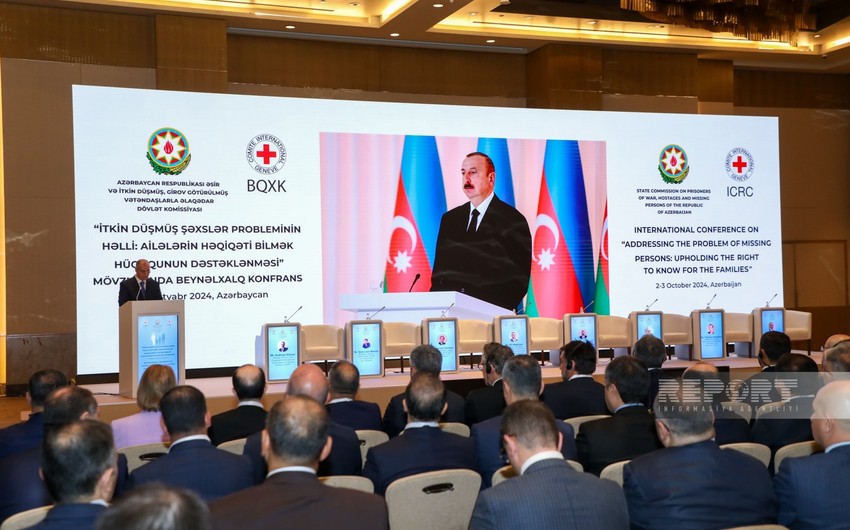President of Azerbaijan Ilham Aliyev has sent a message to the participants of the international conference on "Addressing the problem of missing persons: upholding 'the right to know' for the families," which is underway in Baku.
According to Report, the message was read out by Ali Naghiyev, Chairman of the State Commission on Prisoners of War, Hostages and Missing Persons.
The message reads:
"Dear conference participants!
I welcome you to the international conference on the problem of missing persons.
The organization of the second international conference on the issue of missing persons during armed conflicts in Azerbaijan and on the initiative of our country is further evidence of the relevance of this topic and the importance of stepping up global effort to resolve the problem.
The tragedy of missing persons is one of the grave consequences of Armenia's aggression against Azerbaijan. As a result of the First Karabakh War, up to 4,000 Azerbaijanis have been considered missing for more than 30 years. Among them are civilians, including children and women. Six Azerbaijani citizens went missing in the 2020 Patriotic War.
The new facts identified after the liberation of Azerbaijani lands from the occupation have again confirmed again the witness testimonies regarding the atrocities committed against the missing Azerbaijanis. As a result of the exhumation work in the mass graves discovered in those territories, irrefutable evidence has been collected that the persons Armenia took prisoner and hostage were subjected to torture, violence and inhumane treatment, and killed.
Tomorrow, together with the diplomats accredited in Azerbaijan, you will visit one of the mass graves in Sirkhavand village of Aghdara district. During the Armenian occupation, the Shusha prison functioned as a concentration camp where Azerbaijani prisoners and hostages were kept and tortured.
There is sufficient photo and video evidence in open sources and on the Internet of the inhumane acts committed by Armenia against Azerbaijanis during the First Karabakh War. Although some of those who committed war crimes and crimes against humanity are facing justice in Azerbaijan today, not a single person has been held to account for this in Armenia. On the contrary, they have been treated as heroes.
At the same time, military criminals and commanders in Armenia stated at different times that they had information about mass graves. Nevertheless, Armenia still refuses to provide information about the location of these graves, including the remains of the National Hero of Azerbaijan, Natig Gasimov.
Armenia should abandon its destructive position and fulfil its obligations arising from international humanitarian law. If Armenia is genuinely interested in achieving peace with Azerbaijan, then it must strongly condemn the atrocities committed against the captured Azerbaijanis hostages and prisoners and punish the perpetrators. This could also be an effective confidence-building measure between the two countries.
The government of Azerbaijan takes all necessary steps to determine the fate of missing persons. Since 1993, the State Commission on Prisoners of War, Missing Persons and Hostages has been fulfilling this humanitarian mission. After the Patriotic War, the activities of the Commission were further expanded, achieving good results. The 155 persons missing in the First Karabakh War were identified and they were buried with military honors.
Until now, our governmental institutions, relatives of missing persons and representatives of civil society have repeatedly appealed to various international organizations, but unfortunately, we are faced with double standards in this issue as well. Relevant international institutions should not remain silent in response to these appeals and must take decisive action.
As a responsible member of the international community, Azerbaijan views the issue of missing persons during armed conflicts not only as its own problem, but also as a global one faced by several countries around the world. The fact that a resolution on missing persons is put forward in the UN General Assembly at the initiative of our country every two years and adopted by consensus is an integral part of our efforts to raise international awareness on this issue.
Therefore, we are of the opinion that there is a need to create a special mechanism for missing persons within the framework of the UN in order to ensure that the issue receives the necessary international attention.
In conclusion, I wish the conference success and express my confidence that it will make a valuable contribution to global action towards clarifying the fate of missing persons."


 https://static.report.az/photo/ce311931-2320-3f76-a6a1-86bd24bafd30.jpeg
https://static.report.az/photo/ce311931-2320-3f76-a6a1-86bd24bafd30.jpeg

